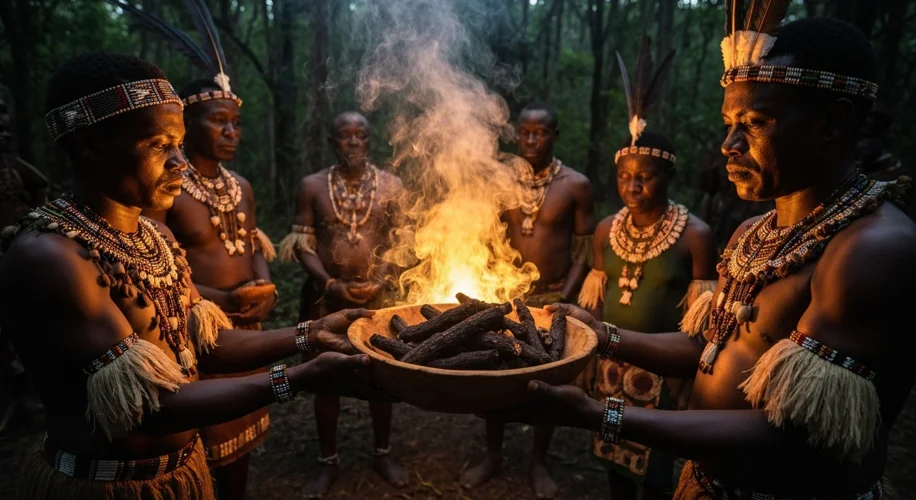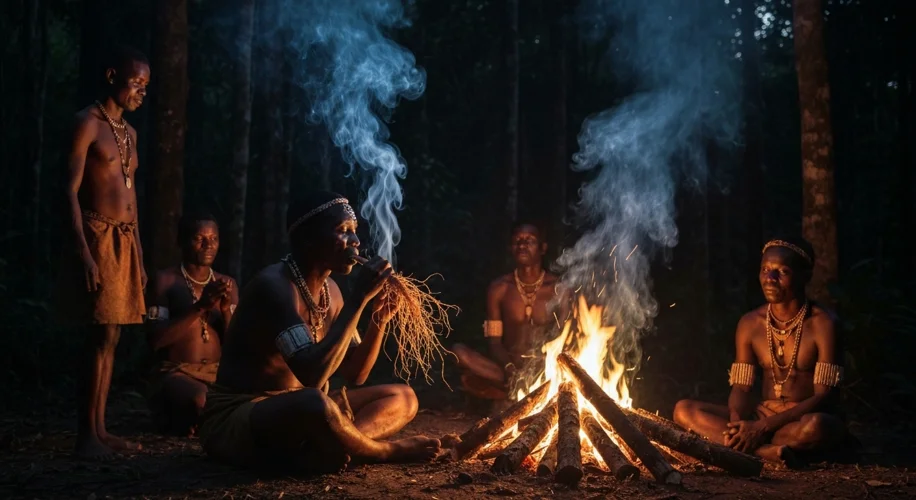Imagine a world without the buzzing screens and constant demands of modern life. A world where the veil between the seen and unseen was thinner, and the whisper of spirits was carried on the wind. For the people of ancient Gabon, over 2,700 years ago, this was not a fantasy, but a profound reality, woven into the fabric of their spiritual and social lives through the ritualistic use of a remarkable plant: Iboga.
Long before the advent of recorded history in many parts of the world, the dense rainforests of Central Africa were home to vibrant cultures with rich spiritual traditions. Among these, the Bwiti spiritual practice, deeply intertwined with the consumption of the root bark of the Tabernanthe iboga plant, stands as a testament to humanity’s enduring quest for altered states of consciousness and deeper understanding.
The Iboga plant, often revered as a divine gift, was central to the Bwiti initiation ceremonies. These were not casual gatherings; they were profound rites of passage, marking the transition from childhood to adulthood, and the awakening of spiritual awareness. Participants would ingest significant quantities of the Iboga root bark, a substance known for its potent psychoactive properties. This was a deliberate, sacred act, undertaken with reverence and respect for the plant’s power.

The experience induced by Iboga is often described as intensely introspective and transformative. For days, initiates would journey through vivid visions, reliving memories, confronting personal traumas, and engaging with ancestral spirits. The effects are not merely hallucinatory; they are often accompanied by a profound sense of clarity, catharsis, and spiritual insight. Bwiti elders, often serving as guides, would interpret these visions, helping the initiates to integrate their experiences and understand their place within the cosmos and their community.
“It is as if the universe opens itself to you,” one ancient Bwiti proverb might have described the experience. “You see the threads that connect all things, and the wisdom of those who came before.” The process was arduous, often involving days of fasting, chanting, and drumming, creating a powerful auditory and sensory environment that amplified the plant’s effects. The Iboga root, with its distinctive bitter taste and powerful aroma, became a sacred sacrament, a key to unlocking the hidden dimensions of existence.
The significance of Iboga use extended beyond individual spiritual awakening. It played a crucial role in maintaining social cohesion and transmitting cultural knowledge. The visions experienced were often communal in nature, reinforcing shared beliefs and values. The elders, having themselves undergone the initiation, were the custodians of this sacred knowledge, guiding the community through the spiritual insights gained from the Iboga journey.
Archaeological evidence, though challenging to find in the humid African climate, points to the long-standing use of psychoactive substances in rituals across the globe. While definitive proof of Iboga’s presence at such early dates is subject to ongoing research, the cultural continuity of its use among the Bwiti people, stretching back centuries, strongly suggests its deep roots in ancient African spirituality.
The legacy of Iboga and the Bwiti tradition is complex. In modern times, the plant has gained attention for its potential therapeutic applications, particularly in treating addiction. However, its potent psychoactive nature also necessitates a deep respect for its traditional uses and the wisdom of those who have guided its ceremonies for millennia. The story of Iboga is a powerful reminder that our ancestors, even without modern technology, possessed sophisticated ways of exploring consciousness and seeking meaning, often through the profound communion with the natural world.

